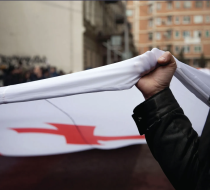The Georgian artists at the forefront of anti-government protests Favorite
The Georgian government’s attempt in March to impose a repressive Russian-style “foreign agent” law has galvanised the cultural community in the country. Museum workers and artists have been at the forefront of dramatic protests during which police fired water cannons at crowds waving European Union flags, and say they plan to continue the battle despite the government backing down from the legislation.
The draft law, if passed, would have mandated media outlets and NGOs with more than 20% of their financing from foreign sources to register as “agents of foreign influence”, a move that strongly resembles legislation pushed through by Vladimir Putin’s Russian government in 2012. A significant number of Georgian contemporary art and cultural projects receive grants from foreign organisations such as Germany’s Friedrich Naumann Foundation for Freedom, the Goethe Institute and the US Embassy, cultural activists tell The Art Newspaper.
The Bouillon Group, an artist collective based in the capital Tbilisi, staged a performance called Weightlifting Strategies featuring bureaucrats on chairs in front of parliament, and its members have been a fixture at anti-foreign agent law rallies.
“For Georgian society, which has long experience of relations with Russia, it is completely obvious that Russia is behind the recent developments in the country,” says Natalia Vatsadze, one of the group’s arists. “Especially the ruling party Georgian Dream, whose leader Bidzina Ivanishvili is the informal leader of the country and who has accumulated his wealth in Russia.” Billionaire Ivanishvili is known for his Kremlin ties and sizeable art collection.
“The ministry of culture has been trying to control artists for their political purposes,” Vatsadze says. “To replace professionals with obedient, dependent workers.” Under the foreign agent law, “any performance by our group that is a criticism of the government and is financed by a foreign fund will be punished”, she says. “First a fine and then prison.”
Georgian Dream officials have accused “US-backed anarchists and satanists” of supporting the protests and corrupting young people, who have turned out in large numbers against the law. Youth at the rallies have invigorated Georgians battered by post-Soviet wars and poverty in the 1990s, the Russian invasion in 2008, and the fallout from the Russian war in Ukraine. Georgia has taken in thousands of Russians who have fled repression and military mobilisation in the past year. The March protests featured numerous expressions of support for Ukraine.
“For Georgians it is a question of being in Europe or going back to Russia,” says Natia Bukia, the co-founder of Project ArtBeat gallery in Tbilisi, speaking from London—where she was opening an exhibition by the artist Nika Kutateladze. Bukia says her sense of nihilism from events of the past year has dissipated in part from the energy of young protesters who “know what they want”.
Uta Bekaia, the founder of Project Fungus, a Tbilisi-based queer art collective, says that young people in Georgia fear the foreign agent law will endanger the local LGBTQ+ community. “They grew up in free Georgia with zero attachment to the Soviet past and can’t comprehend why anyone would do such a thing”, he tells The Art Newspaper from New York, where he had lived for years before returning to Georgia and founding Fungus. The project is “a platform for queer artists to express themselves” that “would not be able to exist under the law in a homophobic system that would never support anything queer”.
Mass firings from cultural institutions
Under Culture Minister Tea Tsulukiani, museum workers have experienced major restructuring and mass firings. “The process was brutal with around 75 employees, including highly experienced and leading scientists, being fired from the Georgian National Museum,” says Nikoloz Tsikaridze, an archeologist who was among those dismissed from the museum. Dozens of specialists have been fired from other cultural institutions and the remaining employees are subject to intimidation and harassment, according to Tsikaridze, who is also the chair of the Trade Union of Science, Education, and Culture Workers of Georgia, which was created after the layoffs.
In February, the Georgian National Museum revoked approval for 13 international research projects funded by the Shota Rustaveli National Science Foundation of Georgia and evaluated by the European Research Council, he says. Tsikaridze provided The Art Newspaper with a list of two dozen further research projects and archeological excavations that have been put on hold due to ministry policies.
Lana Karaia, the chair of the Georgian branch of Icom, the international museums network, says Tsulukiani’s ministry is engaged in a constant “show of power toward the people who are dependent on the ministry; blocking access, controlling museum employees, and treating Icom Georgia as some kind of enemy”. Karaia says that older culture workers have told her that the situation in Georgia has never been this bad “except in 1937”—at the height of Soviet dictator Joseph Stalin’s purges.







